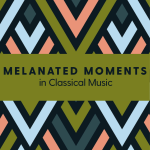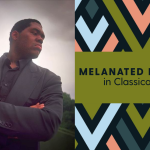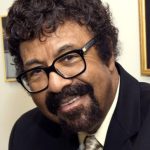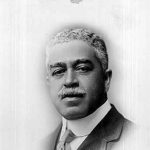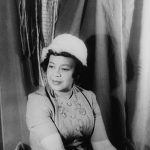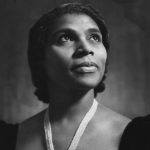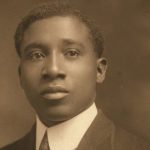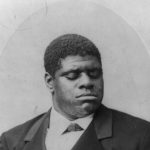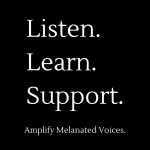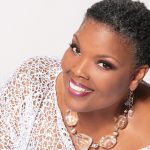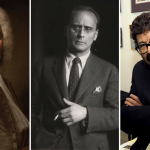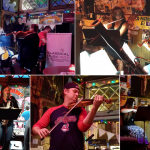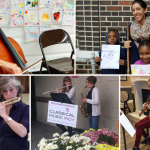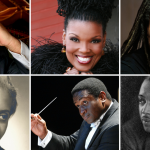MMCM S3E4: Creating Classical Conversations in Jazz – David Baker
Angela and Joshua survey the multifaceted life of legendary David Baker. An iconic composer, educator, performer, and native of Indianapolis, Baker is revered globally for his unique ability to traverse the worlds of jazz and classical music deftly and equally. His works Calypso, A Good Assassination Should be Quiet, and Bolling Suite for cello and jazz piano are featured to demonstrate his signature style that continues to be a model for classical and jazz composers.
Featured Music:
“A Good Assassination Should Be Quiet,” performed by Mary Johnson Letellier and Scott Wheatley
“Bolling Suite for Cello and Jazz Piano Trio,” performed by Yehuda Hanani, Michael Chertock, James Cammack, and Arti Dixson
“Calypso from Suite for Cello and Jazz Trio,” performed by Monika Herzig, Pavel Klimashevsky, Dieter Schumacher, and Manuel Fischer-Dieskau
Joshua Thompson (00:00): Before we get started with this episode, we wanted to thank everyone for your amazing support of this podcast. As our podcast community grows, we have added resources for each episode. So just visit our website to access blog posts and transcripts for each episode or follow us on social media and email us anytime with your podcast suggestions to melanatedmoments@classicalmusicindy.org. Music Plays (00:34): [MMCM Theme] Angela Brown (00:44): Hey everybody, it’s time for another episode of Melanated Moments in Classical Music. I’m Angela Brown… Joshua Thompson (00:51): And I’m Joshua Thompson. Angela girl, I know, for a fact, you got some good stuff for us to gnaw on today! Who we talking about today, Auntie? Angela Brown (01:03): Well, Joshua baby, we are talking about a gentleman that not only performed jazz music on two different instruments, but also was at the helm of a highly rated jazz studies program at a prestigious university right here in Indiana. Joshua Thompson (01:23): Wait, wait, wait, wait, wait. Are we talking about who I think we talking about? Angela Brown (01:28): Well, I don’t know, uh, who do you think we talking about? Joshua Thompson (01:30): Uh, I think we talkin’ about David Baker. [laughter] Angela Brown (01:38): *Ding ding ding ding! David Nathaniel Baker Jr. Was born in Indianapolis, Indiana on December 21st, 1931. He was an American jazz composer, conductor, and musician. Baker attended Indianapolis Public Schools and graduated from my Alma mater, Crispus Attucks High School! Which, at the time, was a segregated public school for African American students– not when I went there, but when he went there. He continued his education at Indiana University, another one of my Alma mater’s, in Bloomington Indiana, where he earned a bachelor’s degree in Music Education in 1953 and a master’s degree in Music Education in 1954. Baker began performing as a trombonist in Indianapolis during high school and college. Now, check this: He played in clubs along Indiana Avenue, the heart of the city’s jazz scene in the late 1940s and early 1950s. He performed with the likes of Jimmy Cole, Slide Hampton, JJ Johnson, and Wes Montgomery. He later credited the Hampton family, especially noted jazz trombonist Slide Hampton, for mentoring him in his early years. Joshua Thompson (03:05): Yes! And that whole family and all of them are still iconic, well-revered here and if you’re ever in Indianapolis and you’re heading downtown on, I think it’s on Capitol. There’s a building, it’s called Musician’s Repair Shop. I spent so much time as a kid there. It’s on the south side of the building, there is an entire mural with the likes of Jimmy Cole, JJ Johnson, Wes Montgomery and David Baker himself. Angela Brown (03:32): Really? Joshua Thompson (03:32): Yeah. It’s been there for years, and people drive right past it. And it’s like, “y’all, there’s history to this”, on the walls, painted for all time. And it is a stunning mural. It’s awesome. Angela Brown (03:44): I’m gonna have to go down there and check it out. But before we go down there and check it out, why don’t we check out a piece from David Baker called “Calypso”. Music Plays (04:05): [Calypso- David Nathaniel Baker] Joshua Thompson (06:42): Listen, I don’t know about you, but I was transported to a beach, and the sun and umbrellas and a cool drink– And uh, listen, it’s the summertime and this feels every bit of vacation I’m here for it. Angela Brown (06:55): Okay, I tell you! We have had so many jazz greats to come out of Indianapolis and Indiana University. And actually, this particular recording has one of our good friends on it. And that’s Monika Herzig– she slaps! [laughter] Joshua Thompson (07:12): Yeah–she is tremendous, internationally, a local favorite. And she’s such a sweet person, she really is. Angela Brown (07:20): Yes, she is. Yes, she is! Well back to David Baker. Okay. Now Baker spent the early part of his career performing and recording in the United States and in Europe, but a facial injury suffered in an automobile accident in 1953, ended his career as a trombonist. But Baker switched to cello and turned his attention to teaching and musical composition. Now how many musicians can go, “Okay. I done busted up my trombone playing jaw. Hmm. Let me play the cello and still be the bomb!”? Joshua Thompson (07:59): Listen. If the face don’t work, the fingers do so, let’s– [laughter] Angela Brown (08:04): Well! — And those fingers helped to pen a lot of jazz compositions. In 1966, he joined the music faculty at the Indiana University in Bloomington, Indiana, where he introduced Jazz Studies as an academic discipline. And it was accepted as an academic degree program in 1968, making it one of the earliest to be established in an American university. Joshua Thompson (08:33): This is major, because this is also at a time where a lot of folks were not thinking that jazz was even acceptable music, let alone a field of study that was worthy of academia. And he was like, “but it is, and here, here’s– and I’m gone teach it.” Angela Brown (08:49): And Baker eventually became an IU distinguished Professor of Music. Okay! Serving as Chair of the Jazz Studies Department and as an adjunct professor in the African American and African Diaspora Studies Department. Baker was among the first to codify the largely oral tradition of jazz. He is credited with writing 70 books, including several on jazz, and writing 400 articles. Joshua Thompson (09:27): Prolific. And it’s ridiculous. I’m going to circle back because I had a question or I’m thinking, I’m assuming a question that maybe our audience has– is the show is called Melanated Moments in Classical Music, and here we go, highlighting a jazz great. There’s a reason why, and I’ll tell you what: before we tell you why or pontificate on why, Angela, do you got another song for us? Angela Brown (09:49): Yes, I do. David Baker had a vast Canon of music, from instrumental, and he also did art songs. So, this next piece that we want to highlight is entitled– Joshua Thompson (10:04): And I think I know what it is because, between you and me, I play it– Angela Brown (10:08): Okay, what’s it called? [laughter] Lemme write this down. What’s it called! Joshua Thompson (10:17): It’s called, “A Good Assassination Should be Quiet”. Music Plays (10:27): [“A Good Assassination Should be Quiet”- David Nathaniel Baker] Joshua Thompson (12:25): Right. Um, you know, I performed this one, uh, usually not with vocalists. I had a wonderful opportunity to do this at The Jazz Kitchen in Indianapolis, back in March with a trombonist, Richard Dole. I love this piece because he is bridging the gap between art, song, and– maybe what some people would consider– new classical music perhaps, somewhat atonal. However, there’s a reason it has so much tension and sounds crunchy because Mari Evans was not playing with nobody when it comes to the text like this because– she wasn’t. Angela Brown (12:59): Exactly– And that is why we are featuring him in Melanated Moments in Classical Music, because you definitely have to know counterpoint theory, all those things that a classical musician needs to know, in order to pen something like that and for it to be so powerful. Joshua Thompson (13:21): I agree, like– even between this piece and the last piece too, I could hear that “Calypso” being arranged for, you know, a small chamber group, because it’s very– has some kind of classical delineations to it. And this one is as well. He’s, like you always say, using all the tools in his tool belt, and he brings his full self and his experience and musical knowledge and puts it on paper, and he is so masterful at it. Angela Brown (13:48): Exactly. Well, you know, in addition to his masterfulness, he served as a musical and artistic director of the Smithsonian Jazz Masters Orchestra from 1991 to 2012. In these roles, he became a leader and mentor to many of the next generation of jazz musicians. Some of his noted students, check this out, included Michael Brecker, Randy Brecker, Peter Erskine, Jim Beard, Chris Botti, Sean Pelton, Jeff Hamilton, and Jamey Aebersold. Joshua Thompson (14:34): Aebersold. If you were a student who’s trying to learn jazz and how to improv, uh, you already have all those books and the CDs where you hear Jamey Aebersold counting off. And every student of jazz has a collection of Jamey Aebersold methods and books in they house! Angela Brown (14:54): Oh my goodness! So, before we play his last piece– Baker died on March 26th, 2016, at the age of 84 in Bloomington, Indiana from complications due to Parkinson’s disease and Lewy body dementia. He left us a canon of music that we will always be able to look back on. I mean, so much that the jazz community and the classical community can always go back and glean from. Joshua Thompson (15:34): Absolutely. Now I’ve got a question for you, Angela: did you have an opportunity to work with– or when you were at IU? Because again, he is a name nationally, internationally, but especially here in Indiana where it’s like “you came from the school of David Baker!”. So, where are you at in this whole– Angela Brown (15:51): Well…You know, I did get a chance to work with Mr. Baker, but it wasn’t, uh– I actually spoke at a program that he was honored at, here in Indianapolis. But of course I knew David Baker, and I’ve sung his music. And I did a concert, actually, that had his music and Mari Evans’ music. I was doing a, uh, Indiana Tribute in a section. So yes, I definitely knew David Baker, and he was a sweet man, sweet man, and very unassuming, just chill. He was a chill jazz cat, you know? Joshua Thompson (16:30): Of course he was! He grew up on the avenue, are you kidding me? That’s what you do. You just show up and do the things. [laughter] Angela Brown (16:36): Definitely. So, we want to listen to his Bolling Suite for cello and jazz piano. Music Plays (16:44): [Bolling Suite for cello and jazz piano- David Nathaniel Baker] Joshua Thompson (20:52): Yeah! Angela Brown (20:53): And that’s why he’s on Melanated Moments in Classical Music. Did you hear that mashup? Joshua Thompson (20:59): When I tell you, Angela– the very beginning opens up and it’s almost undeniable: this sounds very much like Bach. This sounds very much like the folks who were coming outta that Baroque, into that new classical– this is expert. And then he puts the beat down and you’re like, oh, we doin’, something totally different with this! This is such a fun listen. It really is. So, if anyone is ever wondering, “is there a conversation and relationship happening between classical music and jazz?” The answer is yes. And if you want someone to script the conversation for you, David Baker’s a person who does it, and he does it very well every time. Brilliant selections, Angela, like really, really fun… Kind of out of left field, but thank you! Thank you for– [laughter] Angela Brown (21:49): Well, I’m glad that you came on over to right field to enjoy some of it. And until next time, I’m Angela Brown… Joshua Thompson (21:57): And I’m Joshua Thompson. And this has been Melanated Moments in Classical Music. Angela Brown (22:11): Melanated Moments in Classical Music is a production of Classical Music Indy. Our producer is Ezra Bakker Trupiano. Season Three production assistants are Okara Imani and Samantha Hoyer. Our theme music was composed by Laura Karpman. Joshua Thompson (22:29): Season Three of Melanated Moments in Classical Music was made possible in part by Jim and Sarah Lootens. We thank them for their generous support. Angela Brown (22:39): As a fan of this award-winning podcast, we need your help today to create future episodes. You can make Season Four a reality by texting “MMCM” to 202-858-1233. Your support includes exclusive content, playlists, and other perks to thank you for helping us share the stories of even more exceptional Black artists on the podcast. Our podcast partners are Morning Brown, Inc. Joshua Thompson (23:13): And finally, if you’d like to join us in the celebration of the Black experience in the world of podcasting, check out our friends at the Black Podcasting Awards website.
[/su_tab] [su_tab title=”Related Blog Posts” disabled=”no” anchor=”” url=”” target=”blank” class=””]LOCAL CLASSICAL – MELANATED MOMENTS SEASON SIX
As we continue celebrating Black Music Month, this week’s playlist will feature music and artists discussed during the latest season of Melanated Moments in Classical Music. All of season six was recently released and featured vibrant discussions about artists such as Scott Joplin, Hazel Scott, Joseph Bologne, and Kenneth Overton, among others.
LOCAL CLASSICAL – BLACK MUSIC MONTH
In this week’s playlist, we celebrate Black Music Month which takes place in June. It was created by President Jimmy Carter in 1979 to honor and celebrate Black artists’ contributions to music. We’ll be honoring the late Herman Whitfield III, an Indianapolis native who was a gifted pianist and composer. We’ll also hear performances of artists who have been featured in season four of Classical Music Indy’s podcast, Melanated Moments in Classical Music.
LOCAL CLASSICAL – MELANATED MOMENTS
In this week’s Black History Month playlist, we bring you recordings by composers, performers, and artists who have been highlighted in our podcast, Melanated Moments in Classical Music. Melanated Moments is the ward-winning podcast from Classical Music Indy that shines a spotlight on musical works composed by, for, and about Black people.
LOCAL CLASSICAL – HOST OKARA IMANI
Hey, Starshine! This is Okara Imani, Media Production Fellow for Classical Music Indy, and your guide to The “I” in Classical Music. I’m here to highlight the cultural and social intersections of the classical art form, beyond the Classical Period and beyond the constructs of Euro-centric high society origins.
Ric’key Pageot: Inspiring a Moment to Learn, Acknowledge, and Respect
Ric’key Pageot: Inspiring a Mo …
Ignatius Sancho: Composing the Hypocrisy of Colonialism & Convention
Ignatius Sancho: Composing the …
NEW CLASSICAL – DR. BILL BANFIELD
This week we bring you the music of Dr. Bill Banfield. Dr. Banfield is an award-winning composer whose symphonies, operas, chamber works have been performed and recorded by major symphonies across the country. Few have a wider, performed professional composing output, that has had public concert performances, reviews, radio, recordings of some 12 symphonies, 7 opera, 9 concerti, chamber, jazz, and popular forms. This alone making Dr. Banfield one of the most performed, recorded composers of his generation. In 2010 and 2016, Dr. Banfield served as a Pulitzer Prize judge in American music.
#AmplifyMelanatedVoices
Classical Music Indy stands with our Black community. We are here to listen, learn, and lend our support. We believe that classical music is powerful; that it evokes a range of human emotions and creative expression.
Angela Brown Brings her Unbridled Zeal to a New Podcast.
Angela Brown brings her unbrid …
Local Classical – David Baker
We wrap up our Black History Month programming this week with music by Indiana composer David Baker. Born in Indianapolis, Baker served as professor of jazz studies at the Indiana University Jacobs School of Music, founding the jazz studies program.
Local Classical – Angela Brown
We continue our Black History Month programming this week with our featured artist, soprano Angela Brown. Born in Indianapolis, Brown has led a world-renowned career as a vocal soloist. Her highly successful Metropolitan Opera debut in the title role of Aida captured instant attention from international print and broadcast media and catapulted Angela onto the world’s prestigious opera and symphonic stages.
Hallelujah! Handel Survives Duel
It’s not fake news, it’s very real. This Month in Classical Music History is a series dedicated to finding stories of the good, the bad, and the downright weird. For December read about Handel fighting his best friend in a duel, an atonal composer thought to be a Nazi sympathizer, and one of Indiana’s own Jazz legends.
Highlighting our Female Performers
Classical Music Indy employs a diverse range of musicians for our events around Indianapolis. In 2016 we hired 95 musicians. Classical Music Indy has dedicated our blog articles to outstanding women musicians this month. We’ve shared about great women music educators in America and about under-recognized women musicians throughout history. This week, we take a look at a few of Classical Music Indy’s top performers – women who are doing great work here and now in the city of Indianapolis. Read below about these incredibly talented musicians, and hopefully you’ll hear them at one of our events in the near future!



